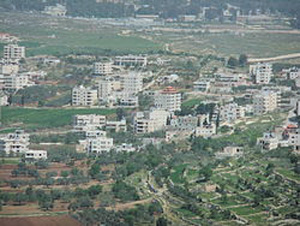
In the late 1990s, a group from our community in Givat Ze’ev hiked to the nearby Arab village of El Jib. As its name indicates, El Jib signifies proximity to the ancient Israelite town of Givon (the small Jewish Givon that abuts El Jib today was built in the 1970s). On that hike, in the quiet days before the second intifada of 2000, security concerns were minimal—a few of the guys carried guns. The highlight of the hike was the big “pool of Givon,” which we were told was the very same one that was the site of a fight between David’s and Saul’s soldiers, who “confronted one another at the pool of Givon” (2 Samuel 2.13).
Recently, I returned to El Jib on another Givat Ze’ev community hike. This time around, we had a professional security accompaniment, both from the army and from a private company, and we had to pass through the large security wall that now separates El Jib from Givon. When we got to the pool a surprise awaited us. Our guide told us that the actual site of the pool in Samuel was now a source of academic contention. He said that recent scholarship suggests that the biblical pool is in a completely different area and that what we were looking at might be “just” a pool, though a rather impressive one.
I looked around me at the group of young Arab boys and men who had appeared upon our arrival and who were observing us (not with particularly friendly eyes), and then I suddenly thought: “What in tarnation am I doing here?” If this was not a sort of biblical roots trip, why were we imposing ourselves on this Arab town?
In various forms, this question has come up again and again in the history of Zionism. There are those who would say that my Givon story is just the Zionist challenge writ small: going into a neighborhood where we are not wanted. Indeed, some people make an easy transition between contemporary Jewish-Arab relations and the hard-heartedness that we had to show in the founding of the State (for an example of the latter, see Ari Shavit’s discussion of the Arab town of Lydda in his excellent book, My Promised Land). However, I think that there is a difference between the upheavals of independence and what happens afterwards. There are enough places for Jews to live in contemporary Israel without having to move into Arab areas. (Of course, the situation is not always so clear cut; for example, what much of the world calls a neighborhood in Arab East Jerusalem may be thought of as a continuation of the West Jerusalem neighborhood of Ramot.)
The type of religious piety that suggests that the holiness of space trumps political and social realities is not a religious piety in which I believe. Do Jews, for example, have the right to live in Hebron? Yes. Should they be allowed to exercise this right in the current political situation? I don’t think so. And while no one is talking about settling in the Arab town of El Jib (yet), I would argue that a similar reasoning applies to visits. Do we have the right to visit El Jib? Yes. Should we? I don’t know about “we,” but I have decided upon the following: When residents of El Jib receive permission to tour some of Givat Ze’ev archaeological sites (and there are several), only then will I return to El Jib. If such a sacrifice urges me to work for a better solution than the status quo, then so much the better.










